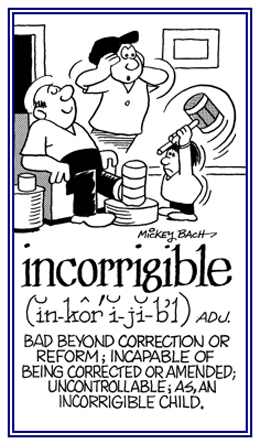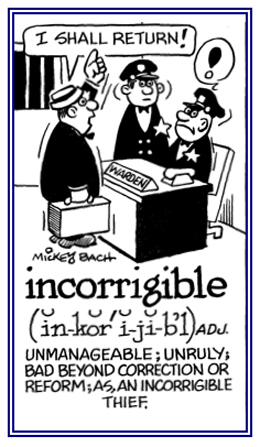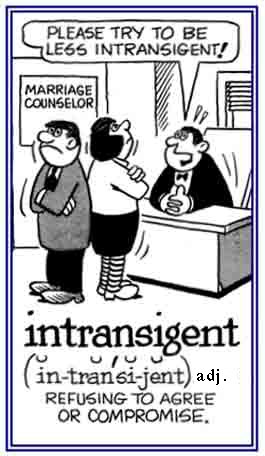ag-, agen-, act-, agi-, agit-
(Latin: to set in motion, to hurry, to shake; to drive; to do, to act; to lead, to conduct, to guide)
The condition of being incurable or a hopeless case; inability to be corrected or amended: The incorrigibility of Jack's habit of leaving his shoes and school things on the floor in the living room when coming home from school was nerve-wracking for his parents.
incorrigible (adjective) (not comparable)
1. Regarding someone who is unmanageable and unable to be corrected or changed, even when punished; unruly: Stella was considered to be quite incorrigible when not returning home at a certain set time, and so she wasn't allowed to go out with her friends for two weeks.
2. Referring to the incapability of being corrected or reformed: Tom was an incorrigible criminal who seemed to spend most of his life in jail because of stealing.
3. Pertaining to someone who is difficult or impossible to control or to manage: Sally was an incorrigible and spoiled child.
4. Etymology: from Old French incorrigible, or directly from Latin incorrigibilis, "not to be corrected"; from in-, "not" + corrigere, "to correct".

© ALL rights are reserved.

© ALL rights are reserved.
Go to this Word A Day Revisited Index
2. Referring to the incapability of being corrected or reformed: Tom was an incorrigible criminal who seemed to spend most of his life in jail because of stealing.
3. Pertaining to someone who is difficult or impossible to control or to manage: Sally was an incorrigible and spoiled child.
4. Etymology: from Old French incorrigible, or directly from Latin incorrigibilis, "not to be corrected"; from in-, "not" + corrigere, "to correct".


Go to this Word A Day Revisited Index
so you can see more of Mickey Bach's cartoons.
inexact (adjective), more inexact, most inexact
1. Concerning something that has been imprecisely expressed: The dates of the documents mentioned by the chairman proved to be inexact when compared to the actual dates on the documents.
2. Descriptive of something that is inaccurate or imprecise: Either Jane's body measurements were inexact or the sizes of the clothes she ordered were inexact because they didn't fit!
2. Descriptive of something that is inaccurate or imprecise: Either Jane's body measurements were inexact or the sizes of the clothes she ordered were inexact because they didn't fit!
inexactly (adverb), more inexactly, most inexactly
Descriptive of how something is inaccurately presented: Andy quoted his mother inexactly when telling his father what happened that afternoon.
The condition of being inaccurate or containing errors: The inexactness of Judy's answers gave her father the impression that she wasn't with her friends after all.
interact (verb), interacts; interacted; interacting
1. To act together or socialize with other people: Mrs. Smart watched Tom interact with the other kids on the playground at school.
2. To affect two or more items or things: Jack asked his doctor, "Does this medication interact with the medications I normally take?"
2. To affect two or more items or things: Jack asked his doctor, "Does this medication interact with the medications I normally take?"
1. The effect which arises when two or more events or items act upon each other and therefore produce a new effect: Dr. Small told Jenifer to be mindful of the interaction between the two medications she was to take.
2. The spoken communication or discourse between people: At the dinner party, Mrs. Black was pleased with the interaction among the guests.
2. The spoken communication or discourse between people: At the dinner party, Mrs. Black was pleased with the interaction among the guests.
interactive (adjective), more interactive, most interactive
1. Pertaining to the reciprocal or mutual communication between people or between things: The school provided interactive activities for the students during their free periods.
2. Concerning the direct communication between a program on a computer and the user: There are many computer games that are interactive and quite exciting.
3. Synergistic: Interactive muscles work together so that a person can walk easily and gracefully.
2. Concerning the direct communication between a program on a computer and the user: There are many computer games that are interactive and quite exciting.
3. Synergistic: Interactive muscles work together so that a person can walk easily and gracefully.
A defiance to moderate one's position; unwillingness to compromise: The intransigence of the elderly Mrs. Jackson was extreme because she stubbornly refused to concede on anything.
Anyone who is stubbornly or unreasonably refusing to consider changing a decision or an attitude: Max and Maxine were two married intransigents who could not agree on many issues and argued almost constantly.

© ALL rights are reserved.
Go to this Word A Day Revisited Index
Although the cartoon is expressing an adjective, it also provides a better understanding of this noun form.

Go to this Word A Day Revisited Index
so you can see more of Mickey Bach's cartoons.
1. Someone who is involved in a disagreement that is being examined in a court of law: It's possible that a litigant will find that his or her case will fit into two or three legal categories.
2. A person who is involved in a lawsuit or who is suing another person or is being sued by someone: Mr. Thompson was a litigant who was defending a claim in court.
2. A person who is involved in a lawsuit or who is suing another person or is being sued by someone: Mr. Thompson was a litigant who was defending a claim in court.
An abnormal anxiety about being sued or being involved in lawsuits: Jack, who was quite poor and having litigaphobia, was not only terrified of lawyers, but also feared any kind of litigation procedures where he would have to pay money, which he didn't have, or even have to go to jail!
litigate (verb), litigates; litigated; litigating
1. To engage in legal proceedings: The company's unwillingness to make a deal increased Mrs.Long's desire to litigate.
2. To institute legal proceedings against someone or an organization; to file a suit against: Those people involved agreed to litigate all disputes in the court the following day.
3. Etymology: from the early 17th century, from Latin litigat-, past participle of litigare, lit-, "lawsuit" + agere, "to drive".
2. To institute legal proceedings against someone or an organization; to file a suit against: Those people involved agreed to litigate all disputes in the court the following day.
3. Etymology: from the early 17th century, from Latin litigat-, past participle of litigare, lit-, "lawsuit" + agere, "to drive".
1. The process of carrying on lawsuits or a specific lawsuit: Mrs. Big is involved in litigation against the city.
2. The use of the legal system to settle a dispute or a disagreement: Although the court proceedings took place during the past month, the case is still in litigation.
3. The act or process of bringing about or contesting a lawsuit or all lawsuits collectively: The workers' complaints are still in litigation.
2. The use of the legal system to settle a dispute or a disagreement: Although the court proceedings took place during the past month, the case is still in litigation.
3. The act or process of bringing about or contesting a lawsuit or all lawsuits collectively: The workers' complaints are still in litigation.
litigious (adjective), more litigious, most litigious
1. Regarding an inclination or a pretence of an inclination to dispute or to disagree, even to engage in law suits: Mrs. Small had a litigious and acrimonious attitude instead of trying to work things out with negotiations.
2. Referring to a person who constantly brings or who prolongs legal actions; particularly when the legal maneuvers are unnecessary or unfounded: Litigious people often enjoy legal battles, the controversy, the courtroom, and the spotlight, so they use the courts to punish enemies, to seek profits, and to pursue minor issues which do not deserve judicial attention.
3. Etymology: from the late 14th century, "fond of disputes", from Latin litigiosus "contentious, quarrelsome"; from litigium, "dispute, strife" which is related to litigare, "to dispute, to quarrel, to strive," from litem, "lawsuit, dispute, quarrel, strife" + root of agere, "to drive, to conduct".
2. Referring to a person who constantly brings or who prolongs legal actions; particularly when the legal maneuvers are unnecessary or unfounded: Litigious people often enjoy legal battles, the controversy, the courtroom, and the spotlight, so they use the courts to punish enemies, to seek profits, and to pursue minor issues which do not deserve judicial attention.
3. Etymology: from the late 14th century, "fond of disputes", from Latin litigiosus "contentious, quarrelsome"; from litigium, "dispute, strife" which is related to litigare, "to dispute, to quarrel, to strive," from litem, "lawsuit, dispute, quarrel, strife" + root of agere, "to drive, to conduct".


